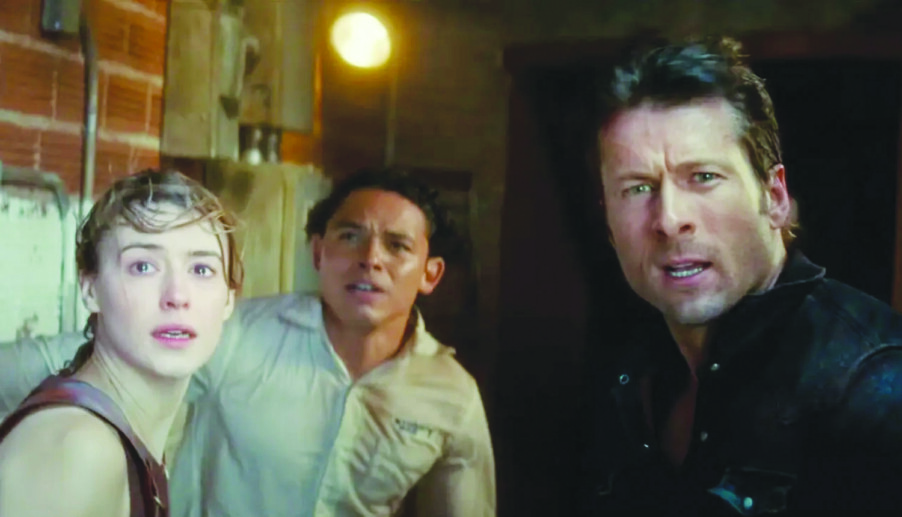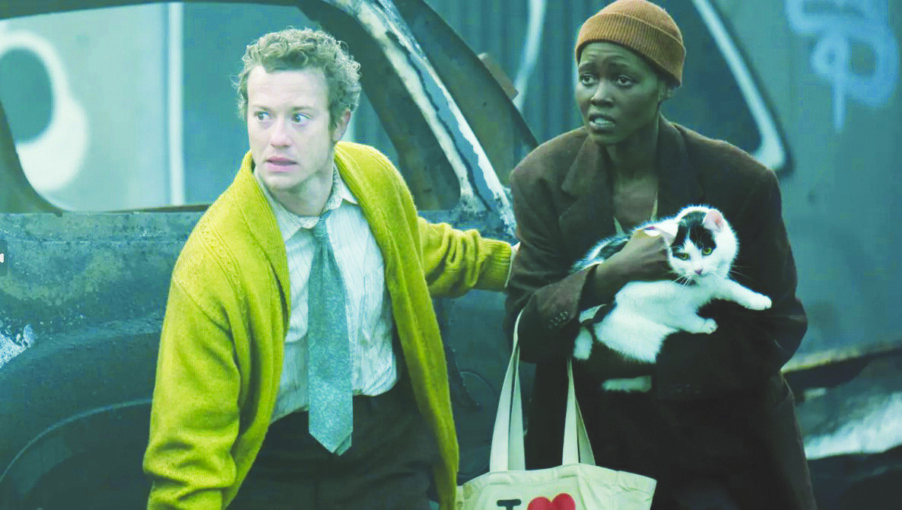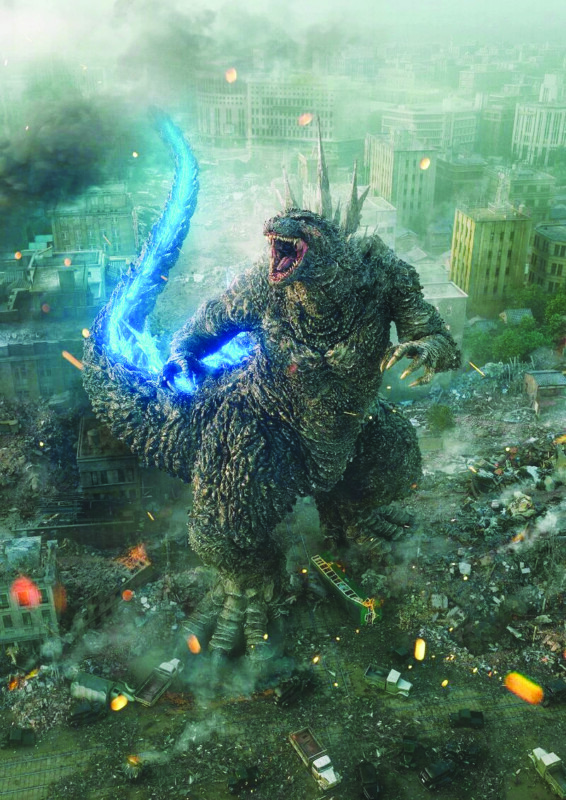Horizon: An American Saga — Chapter 1
Kevin Costner co-writes, directs and stars in the expansive Western Horizon: An American Saga — Chapter 1, what feels like a three-hour TV pilot.
And who knows how this will shake out — with Chapter 1 not a box office hit and now available in premium VOD and Chapter 2 pulled from the August release schedule, maybe you will be watching this alleged four-part movie only on the small screen.
We meet what feels like a million characters, many of whom are dudes with beards or blond ladies, most in dust-covered brown get-ups, so it can be hard at times to follow which beard-dude’s story we’re watching. Generally, we are following the beginnings of the American settlement of Horizon, a town (which Wikipedia tells us is in Arizona) that we see a surveyor laying out plots for as the movie opens. The next look we get at the surveyor and his family is when another dude shows up to find their fly-covered remains and bury them. Sometime later, we meet a group of people who have created a mostly tent-filled town of Horizon across the river from the graves of the surveyor family. The characters who will matter most from this group are Frances Kittredge (Sienna Miller) and her young-teen-ish-aged daughter Elizabeth (Georgia MacPhail). The town is attacked and burned to the ground by Apache warriors, who don’t love all these settlers “discovering” and moving onto the land they have been and are currently living on. Survivors of the attack include the Kittredge ladies as well as Russell (Etienne Kellici), a kid who escapes to get the army at a near-ish-by fort. Thus do we meet First Lt. Trent Gephardt (Sam Worthington) and Sgt. Major Thomas Riordan (Michael Rooker), who take a particular shine to the grief-stricken Kittredge family.
Meanwhile, Lucy (Jena Malone) has apparently been terrorized by some man whose child she bore. She shoots him and takes the baby and runs and then his extremely awful adult sons are sent to find them. During her life on the run, Lucy shares a house and child care duties with Marigold (Abbey Lee), a, uhm, professional freelance fancy lady who tries to woo potential customer Hayes Ellison (Kevin Costner). Stuff happens involving the terrible sons after Lucy, and Hayes, Marigold and Lucy’s baby end up on the run together.
The movie gives the Apache a storyline, with Pionsenay (Owen Crow Shoe), the head of the raid on Horizon who wants to fight to get the settlers off their land, facing off against Tuayeseh (Gregory Cruz), the tribal elder who would prefer to just stay off the white settlers’ raiders all together.
And there’s a whole plot involving Russell, who joins up with a posse looking for the Apache that destroyed Horizon or, if they can’t find them, basically any Native Americans they can take their anger out on (and also collect bounty for killing).
And and we meet a wagon train which I guess, based on the cast list on Wikipedia, includes more Kittredges but the movie is more focused on snooty British wagoneers Juliette (Ella Chesney) and Hugh (Tom Payne), who are a real headache for the, like, mayor of the wagon train, Matthew Van Weyden (Luke Wilson playing a Luke Wilson character).
There are oodles of other side characters and small performances by actors you know, including Danny Huston as an army muckety muck who delivers the speech about people making it in the West — if they’re clever enough, tough enough, mean enough, etc. That speech is the movie’s mission statement and it works fine in the trailer but feels particularly “stop and watch me orate” in the movie. One other “yeesh” acting moment of note is when the movie makes Russell, a child, do some “oh the humanity” stuff near the movie’s end. It’s just asking an unfair amount from a kid actor who has been basically fine up until then.
Look, there are few things more cinematic than the expanse of the American West. Throw some people on horseback riding through it and you almost don’t need an actual story. I understand the basic appeal of a movie that looks at the whole messy history of American westward expansion and all that that entails set against the backdrop of beautiful desert, mountain and plains scenery. But this movie is just a big bucket of plot water spilled all over everywhere that does not even come together in the end. What we get in the movie’s final moments is a chunk of scenes that feel like a “this season on Horizon” clip package giving us a sense that all of these people are headed to (or back to) Horizon. But even that is vague and vibesy with a lot of Costner about to draw on some fellow gunslinger or ladies in updos looking wistful.
In 2022 Tara Ariano wrote a piece for Vanity Fair headlined “5 Signs Your TV Show Should Be a Movie.” Horizon has the exact opposite problem, smooshing half a season of a clearly-should-be-a-TV-show into something that barely reads as a movie. C+ (the + being largely for cinematography) Available for rent or purchase.
Babes (R)
Pamela Adlon directed and Ilana Glazer co-wrote (with Josh Rabinowitz) this tale of longtime buddies facing life and children in Babes, which stars Glazer and the always awesome Michelle Buteau.
We meet Dawn (Buteau) and Eden (Glazer) as they get together for a 9 a.m. movie screening on Thanksgiving, a longstanding tradition. Dawn is heavily pregnant with her second child and seems to be in the earliest stages of labor but figures she has hours to go before any serious birthing begins. She does not, which is how Eden ends up attending the birth of Dawn’s second child. Afterward, Eden attempts to get Dawn and her husband Marty (Hasan Minhaj) something to eat but is then barred from reentering the maternity ward because it is after hours and she’s not technically family. All of which explains how Eden finds herself on a long subway ride on Thanksgiving day with over $400 worth of sushi. She ultimately shares the sushi with fellow passenger Claude (Stephan James), an actor also returning home to Eden’s Astoria neighborhood after a day of shooting a Martin Scorsese film. Over sushi, their meet-cute becomes a friendship which becomes an invitation to Eden’s apartment which becomes a special evening-into-morning for both of them. How special Eden learns later when she finds out she is pregnant.
Meanwhile, Dawn is struggling with breastfeeding and the family readjustments that come with having a new baby — her preschool-age son has decided he wants to be a baby again, and her beloved nanny has been hired away, making Dawn’s return to work difficult. As Eden leans on Dawn throughout her pregnancy, Dawn seems increasingly incapable of handling Eden’s neediness and is maybe slipping into some kind of postpartum depression.
Gestating and caring for babies and young children is messy and exhausting and leaves little room for things like friendships or personal sanity, seems to be the movie’s operating principle, which is extremely accurate. And this is portrayed here with both truthfulness and fondness for motherhood, the blend of which I feel like I still don’t see enough. Motherhood fundamentally changes everything and Babes does a good job of showing what that means for a friendship — not so much that it ends or fades but has to go through its own kind of messy growth process to continue. It also does a good job of just showing the grind of it all, especially through Dawn’s story, which includes her attempts to balance work with child care and her relationship with Marty and their financial stability. It’s an honest snapshot of all the emotional highs and lows delivered with enough laughs that I found the whole thing very charming with a friendship tale that is genuinely sweet. B+ Available for rent or purchase.
Unfrosted (PG-13)
Jerry Seinfeld directed and co-wrote Unfrosted, a Netflix movie about the making of Pop-Tarts that was recently nominated for a best TV movie Emmy.
This comedian make-work project full of dozens of Seinfeld-friend cameos features very few true facts — one is that cereal heiress Marjorie Post built Mar-a-Lago (American history is weird!). It is a gleeful riff on the 1960s as told through the lens of a Kellogg/Post war for breakfast dominance — all milk men and Cold War and space race and Mad Men. It is deeply stupid and, if you like this sort of thing, laugh-out-loud enjoyable.
Seinfeld, who continues to really just play himself, is a Kellogg corporate man tasked with beating Post to their latest invention, some kind of shelf-stable pastry item. On team Kellogg are also Jim Gaffigan, Melissa McCarthy and Hugh Grant as an increasingly unhinged classical Shakespearean actor who earns a living as Tony the Tiger. Amy Schumer and Max Greenfield are on Team Post. Christian Slater shows up as part of the milk man racket, which is run by Peter Dinklage. When Grant’s character eventually leads food mascots on a riot they are joined by Snap, Crackle and Pop — Kyle Mooney, Mikey Day and Drew Tarver, respectively.
I could have lived without the Jan. 6 callbacks of that scene but otherwise this movie is entirely cartoony nonsense frosted with Seinfeldian love of irrelevant minutiae. I realize people have all kinds of feelings about present day Seinfeld — if that is you, no worries. You’re not missing a great cultural artifact with this one.
But if you are basically fine with Seinfeld and enjoy whimsical dumbness, Unfrosted is a corn syrup-y treat. B Available on Netflix.
Beverly Hills Cop: Axel F (R)
Eddie Murphy rides again as Detroit police detective Axel Foley in Beverly Hills Cop: Axel F.
This Netflix release clears the low bar of feeling like a real movie and offers the added bonus of genuinely enjoyable-to-watch (for the most part) movie star Eddie Murphy along with some 1980s nostalgia and some tolerably fun action. Axel is called out to Beverly Hills by old pal Billy Rosewood (Judge Reinhold), a retired detective now working as a private investigator. Billy has been working on one of his old cases and asked Axel’s daughter Jane (Taylour Paige), a defense attorney, to take the case of a man he believes was wrongfully accused of murdering a police officer. Billy had been investigating the officer and believed he might be part of a bigger conspiracy. Now Jane is facing threats from muscle-y bad dudes if she doesn’t drop the case. Axel heads west but when he arrives Billy is nowhere to be found. Though Axel and Jane have a difficult relationship, they eventually team up.
Along the way, there are jokes and cameos (John Ashton, Bronson Pinchot, Paul Reiser) and a light romance plot involving Jane and her ex, police detective Bobby (Joseph Gordon-Levitt), who is of course working the same case. It’s all perfectly fine — better than it would be if just some regular old Netflix players were doing the same plot, not as good as if we were approaching new material. (I’m pretty sure I saw Beverly Hills Cop back in the day but I don’t really remember it or have strong feelings about the franchise.) But if you liked the original, I don’t think this outing is an embarrassment. Murphy brings more spark, more “I am willing and reasonably happy to be here” to this than Will Smith and Martin Lawrence did to their recent Bad Boys entry. Kevin Bacon shows up to turn in a villain performance that probably didn’t strain anything to give but that he also seemed to be having a loose good time with. It is a surprisingly not-bad meal at a middling restaurant and you leave a little more satisfied than you expected to be. B-Available on Netflix.
The Exorcism (R)
Russell Crowe plays a troubled actor playing a troubled priest in this meta demon horror movie that needs to be more fun.
Anthony Miller (Crowe) is a one-time action star trying to recover from addiction to alcohol and drugs, repair his relationship with his teenage daughter Lee (Ryan Simpkins) and perhaps even forgive himself for abandoning his late wife as she was struggling with cancer. He is also trying to repair his career and to that end takes a role playing a priest in a movie that is sort of positioned as a The Exorcist remake. The role is available after the mysterious death of the actor who previously played the role. Director Peter (Adam Goldberg) makes it clear that hiring Tony is a risk for him but Tony just wants to work again. Which is perhaps why Tony doesn’t immediately realize that playing a priest, with the collar and prayers and all, might dredge up some undealt-with traumas from his childhood as an altar boy in a church notorious enough that Peter had heard about it on the news.
Lee accompanies Tony on set and so she sees him struggle both at work (with remembering lines and delivering whatever “broken man” pathos Peter is looking for) and at home, where she finds him creepily sleepwalking and reciting weird stuff in Latin. The movie’s consultant priest Father Conor (David Hyde Pierce) initially tells Lee her father’s difficulties are of an earthly nature and he, a psychiatrist, will talk to him. But then Father Conor pulls out ye olde booke of demon etchings and whatnot, suggesting that Tony’s troubles might not be entirely psychological.
I mean, we eventually move to the deep voice and the extraordinary physical abilities so the “is he having a breakdown from trauma or is he possessed” question is answered pretty definitively. Which is fine — in a movie called The Exorcism you’re expecting a demon. I was also intrigued with the elevator pitch of “an exorcism movie causes a possession in a cast member” — “intrigued” sounds more high-minded than the “ooo, this looks like goofy fun” reaction I had to the trailer. But this movie is too sad to be goofy fun and too uneven to really work on any other level. Goldberg’s smarmy director is built for the fun version of this movie, swinging from exasperated at Tony to sadistically poking at his traumas to try to get a better performance. Lee, Father Conor and Blake (Chloe Bailey), the actress playing the possessed girl in the movie, feel like they’re in some different more straightforward possession movie aimed at teens. Crowe is giving just the saddest man on Earth as Tony — even when the demon possession really kicks in. Russell Crowe seemed to have way more fun in last year’s The Pope’s Exorcist, which is where I recommend turning if what you’re looking for is a good time with Crowe in a priest collar yelling religious stuff at a demon.C Available for rent or purchase.






